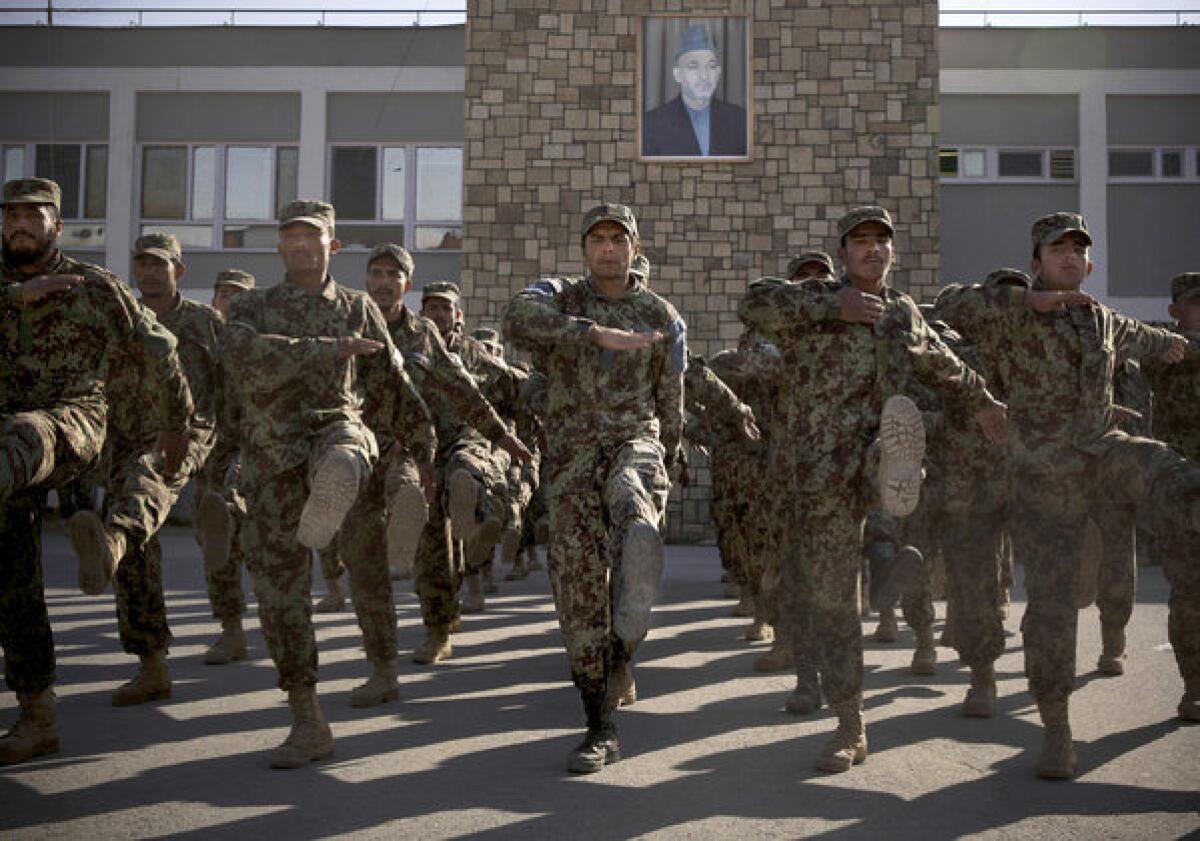Watchdog faults U.S. military’s oversight of aid to Afghanistan

- Share via
KABUL, Afghanistan — A federal watchdog agency on Thursday accused the U.S. military in Afghanistan of failing to conduct an adequate risk assessment for managing and accounting for $3 billion in military aid spent by U.S. taxpayers on Afghan security forces in their fight against Taliban insurgents.
The U.S. military command in Afghanistan responded immediately with a statement saying the watchdog, the Special Inspector General for Afghanistan Reconstruction, or SIGAR, had acknowledged steps taken by the U.S. military to “mitigate financial weaknesses” regarding U.S. money for the Afghan military.
The battling statements were the latest in an ongoing public relations struggle between SIGAR and the military and other U.S. government agencies regularly targeted by the watchdog’s reports alleging waste, fraud or abuse. SIGAR was established by Congress to monitor taxpayer-funded reconstruction efforts in Afghanistan, which have totaled $96.5 billion so far.
SIGAR emailed its latest findings to journalists late Wednesday with an advisory that media accounts could not be published before public release of the report at 8 a.m. EST Thursday.
The U.S. military statement was sent to reporters six hours before that deadline in an effort to get its response to them in time to be included in their published reports.
It was an unusually swift response by the U.S. military here, which acknowledges that it has been slow in the past to respond to SIGAR reports, audits and so-called warning letters alleging misuse or inadequate oversight of taxpayer money.
In the 23-page report, SIGAR said its review of $4.2 billion designated as of September for the Afghan military — and $3 billion already paid — found weaknesses in the way the U.S. military identifies potential risks to the money. The agency criticized U.S. military financial management assessments of Afghan ministries.
However, the SIGAR report also credited the U.S. military with identifying shortcomings and taking effective steps to remedy problems. It listed four specific measures instituted by the military.
The U.S. military statement highlighted SIGAR’s mention of those measures with a headline that read: “U.S. forces continue to improve management of ANSF funds,” referring to Afghan National Security Forces.
The statement said that the U.S. command in Afghanistan “appreciates SIGAR’s acknowledgement that its processes for managing U.S. direct assistance continue to improve, mature and evolve as the capabilities of the Afghan government increase.” It said the U.S. command has “improved accounting practices” and “conducted risk assessments to identify vulnerabilities” at three Afghan ministries receiving U.S. military aid.
The statement also said the U.S. military here was committed to “being stewards of U.S. taxpayer and international donor funds.” It said the U.S. command would continue to adjust its measures to prevent waste, fraud and abuse.
SIGAR’s headline on its report said the U.S. military “could improve oversight” over taxpayer money sent to the Afghan military.
In a letter Tuesday to Defense Secretary Chuck Hagel, John F. Sopko, the SIGAR inspector general, wrote, “I appreciate the efforts” by the U.S. command in Afghanistan to “protect U.S. taxpayer dollars.”
But Sopko also urged Hagel to conduct a “comprehensive assessment” to determine risks to funds sent to the three Afghan ministries to support the Afghan military.
SIGAR also said it had sent a letter to the Pentagon on Wednesday saying the agency would restart its investigation into construction of a nearly $36-million military command and control center at Camp Leatherneck in southern Afghanistan.
In its email to reporters, SIGAR said the action was in response to a recent Army investigation “that recommended U.S. taxpayers invest additional money to complete this building,” which SIGAR says has never been used.
The U.S. military statement in Afghanistan did not address that issue. A U.S. public affairs officer here did not immediately respond to a request for comment Thursday.
In a statement Thursday, Sopko said he was encouraged that the military command in Afghanistan was taking oversight seriously. “But it’s clear, as this report underscores, that more needs to be done to protect American taxpayers as billions in U.S. aid flows directly to the Afghan government,” he said.
ALSO:
Russian media deride Kerry visit to Moldova
Car bomb blast targets Yemen Defense Ministry; 25 killed
Karzai accuses U.S. of killing civilians in November drone strike
Twitter: @davidzucchino
More to Read
Sign up for Essential California
The most important California stories and recommendations in your inbox every morning.
You may occasionally receive promotional content from the Los Angeles Times.













